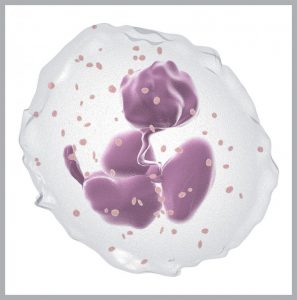Neutrophils are a type of white blood cell. In fact, most of the white blood cells that lead the immune system’s response are neutrophils. There are four other types of white blood cells. Neutrophils are the most plentiful type, making up 55—70% of your white blood cells. White blood cells, also called leukocytes, are a key part of your immune system.

Your immune system is made up of tissues, organs, and cells. As part of this complex system, white blood cells patrol your bloodstream and lymphatic system. When you’re sick or have a minor injury, substances that your body sees as foreign, known as antigens, call your immune system into action.
Examples of antigens include:
- bacteria
- viruses
- fungi
- poisons
- cancer cells
White blood cells produce chemicals that fight antigens by going to the source of the infection or inflammation. Neutrophils are important because, unlike some of the other white blood cells, they aren’t limited to a specific area of circulation. They can move freely through the walls of veins and into the tissues of your body to immediately attack all antigens.
Absolute neutrophil count (ANC)
An absolute neutrophil count (ANC) can provide your doctor with important clues about your health. An ANC is typically ordered as part of a complete blood count (CBC) with differential. A CBC measures the cells that are in your blood.
Your doctor may order an ANC:
- to screen for a number of conditions
- to help diagnose a condition
- to monitor your status if you have an existing disease or if you’re undergoing chemotherapy
If your ANC is abnormal, your doctor will likely want to repeat the blood test multiple times over a period of weeks. This way, they can monitor for changes in your neutrophil count.
What to expect
For the ANC test, a small amount of blood will be drawn, usually from a vein in your arm. This will happen at your doctor’s office or in a lab. The blood will be evaluated in a laboratory and the results will be sent to your doctor.
Certain conditions can affect the results of your blood test. Be sure to tell your doctor if you’re pregnant, or if you’ve had any of the following:
- a recent infection
- chemotherapy
- radiation therapy
- corticosteroid therapy
- recent surgery
- anxiety
- HIV
Understanding the results
It’s important to have your doctor explain your test results. Results can vary widely from lab to lab. They’re also different depending on:
- your age
- your gender
- your heritage
- how high above sea level you live
- what instruments were used during testing
Note that the reference ranges listed here are measured in microliters (mcL), and are only approximate.

Sources: International Waldenstrom’s Macroglobulinemia Foundation (IWMF) and Neutrofilos.org
>> Read more about Neutrophils and what they do
What causes high neutrophil levels?
Having a high percentage of neutrophils in your blood is called neutrophilia. This is a sign that your body has an infection. Neutrophilia can point to a number of underlying conditions and factors, including:
- infection, most likely bacterial
- noninfectious inflammation
- injury
- surgery
- smoking cigarettes or sniffing tobacco
- high stress level
- excessive exercise
- steroid use
- heart attacks
- chronic myeloid leukemia
What causes low neutrophil levels?
Neutropenia is the term for low neutrophil levels. Low neutrophil counts are most often associated with medications but they also can be a sign of other factors or illness, including:
- some drugs, including those used in chemotherapy
- suppressed immune system
- bone marrow failure
- aplastic anemia
- febrile neutropenia, which is a medical emergency
- congenital disorders, such as Kostmann syndrome and cyclic neutropenia
- hepatitis A, B, or C
- HIV/AIDS
- sepsis
- autoimmune diseases, including rheumatoid arthritis
- leukemia
- myelodysplastic syndromes
You’re at greatest risk of infection if your neutrophil count drops below 1,500 neutrophils per microliter. Very low neutrophil counts can lead to life-threatening infections.

Outlook
If your neutrophil counts are high, it can mean you have an infection or are under a lot of stress. It can also be a symptom of more serious conditions. Neutropenia, or a low neutrophil count, can last for a few weeks or it can be chronic. It also can be a symptom of other conditions and diseases, and it places you at greater risk for acquiring more serious infections.
If abnormal neutrophil counts are due to an underlying condition, your outlook and treatment will be determined by that condition.

